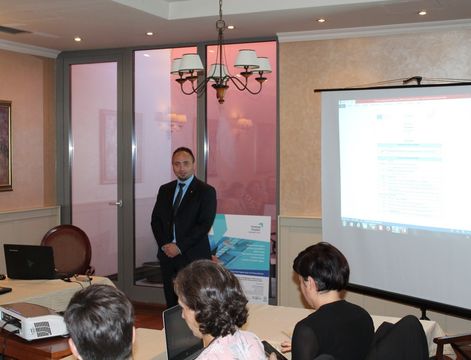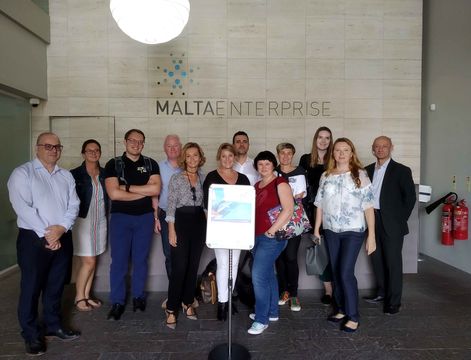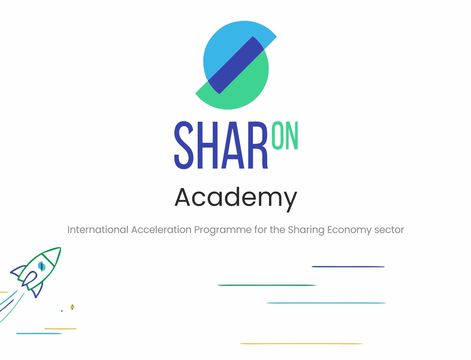
Policy change in Podravje, Slovenia
Innova Foster project has already achieved change regarding the Regional Development Programme (RDP) of Podravje Region
Innova Foster aims at leveraging startups (scalable, high-potential SMEs with less than 5 years of life) growth through their engagement into the innovation processes at local or regional level and improving their role as regional and industry innovation providers in seven European regions.
As the EU2020 Strategy underlines startups are flourishing in Europe generating growth, employment and innovative services.
Therefore, the main objective of Innova Foster project is to:

"Traditional boundaries between manufacturing and services are increasingly being blurred and the success of industry depends very much on innovative services but regional and industrial development policies and tools still do not often take sufficient account of these changes.”
(Antonio Tajani)
€1,167,148.00
SME competitiveness
Innova Foster will include interregional visits, local stakeholders engagement and joint research into improvement of regional and local policies and programmes to support the growth of high-potential SMEs to make them ramp-up, growth and get global.
All partners will identify, analyse, exchange knowledge, the best and worst practices about regional situation of startups and innovation ecosystems and will end up with its own policy-mix on an inward-looking process and benchmarking.
The action plans will be implemented as demonstrators, de-risking the development and scale-up of novel service systems, encouraging engagement with stakeholders and users, sharing experience across Europe and identifying clusters of expertise and opportunities for partnership.
Objective: To strengthen the productivity of enterprises, boost research and innovation, enable the shift towards a more low-carbon and environmentally-friendly economy.
Priority concerned: Thematic objective 3, Competitiveness.
Spanish SMEs, in general, are deficient in competitiveness, innovation and internationalization, largely due to its small size. Accordingly to the Spanish Position Paper and the Council’s Recommendations, Spain needs to promote the creation of new tech-based and innovative companies. Two IP are included:
- IP. 3.a. Promoting entrepreneurship, in particular by facilitating the economic exploitation of new ideas and fostering the creation of new firms, including through business incubators.
- I.P. 3.d. Supporting the capacity of small and medium sized enterprises to grow in regional, national and international markets and to engage in innovation processes.
*Reasons why it should be improved: While the first one is focused on business creation, the second concentrates all the attention on increasing the percentage of SMEs that export on a regular basis. However, THE OBJECTIVE OF ACHIEVING THE GROWTH POTENTIAL OF THE SMES IS NOT PROPERLY ATTENDED. If we want to promote innovative and tech-based firms, we need to help them grow in the market. STARTUPS ARE THE SOURCE THE INNOVATION THE INDUSTRY NEEDS, BUT NEITHER THE INDUSTRY NOR THE ENTREPRENEURS ARE BEING ABLE TO REACH EACH OTHER IN AN EFFICIENT WAY. There is a gap to be bridged under the TO3
Objective:
The TRDS is a comprehensive development and implementation framework guiding the development agenda of Torun. It’s designed to provide clear strategic direction with respect to projects and activities in line with the Union’s Europe2020 goals.
Priority Concerned:
SCALE ACCELERATION Program. This program is focused on ICT-SME competitiveness. This priority support innovative and growth oriented micro-enterprise business start-ups, with a particular emphasis on high-growth ICT sectors.
Reasons why it should be improved:
This action program has been focused so far in an original acceleration program with its complex services offered to ICT beneficiaries. The program assumes the identification of high-potential business in very early stage of development and the
chosen startups receive seed financing and a toolbox of IT solutions with substantial support of our business incubator.
So far, the program has helped in the creation of new startups but this initial support is not enough to help them grow at the expected fast pace. Even if all the strategic documents underlines the role of startups as the source of innovation, WE STILL NEED TO GENERATE THE ENVIRONMENT TO BRIDGE THE GAP BETWEEN STARTUPS AND INDUSTRY.
Objective:
GMESF is the plan that sets out how the EU funds are allocated to the Greater Manchester region from the ERDF England Operational Programme 2014-2020 and how they will be spent.
Priorirty Concerned:
Priority 3 – SME competitiveness – Oldham needs to improve the competitiveness and productivity of its businesses, in particular Young SME’s. This Investment Priority will help support SME to become more competitive, thus increasing survival and growth rates and creating jobs and prosperity.
Reasons why it should be improved:
Oldham's economy generated £2.9 Billion during 2013, which provides around 6% of the total GVA generated within Greater Manchester. However, GVA per head in Oldham is the second lowest within the region and the UK Competitiveness Index showed that Oldham ranked 367th out of 379 local authorities nationwide. If Oldham’s SME’s are to survive and grow they need to increase productivity, become more innovative and competitive.
To address this situation we need to provide support that will help businesses innovate, improve productivity and access new markets. Oldham businesses can already access a range of traditional support through sub-regional partners, the Manchester Growth Hub, however, competitiveness should be searched by THE ENGAGEMENT OF SMEs IN INNOVATION PROCESSES AND THE ENCOURAGEMENT OF COLLABORATION AMONG BUSINESSES. WE NEED TO ENGAGE OUR SMES IN INDUSTRY INNOVATION, ESPECIALLY IN MANUFACTURING SYSTEMS.
Objective: RDP defines the development and strategic goals of the region on the economic, social, spatial and environment fields.
* Priority Concerned: Priority 3 – SME competitiveness. The specific objective is to increase the number of enterprises in the region by supporting business start-ups, business expansion and higher innovation levels in micro-enterprises. This investment priority will support business with a particular emphasis on high-growth and potentially high-growth sectors.
Reasons why it should be improved: The current priority design aims to develop a supportive environment through the generation of economic and research infrastructure, new support services (business information, advisory services, capability building, mentoring, etc) and financial subsidies to encourage start-ups and social enterprises and cooperatives.
However, we need to help all these SMEs that we’re creating to growth, specially attending to the particular emphasis on high-growth and potentially high-growth sectors. Our start-ups are becoming a source of innovation – statistically, they are more than four times more innovative than the consolidated ones- that we need to capitalize. HELPING START-UPS GROWTH AND INDUSTRY COMPETITIVENESS COULD BE DONE THROUGH THE JOINT DEVELOPMENT OF BOTH THE START-UPS AND INDUSTRY CLUSTERS ON THE BASIS OF THE INNOVATION.
Objective: To strengthen the productivity of enterprises, boost research and innovation, enable the shift towards a more low-carbon and environmentally-friendly society, foster health and social development.
Priority Concerned: Priority 3 – SME competitiveness. Interventions aimed at enhancing the further development of already established SMEs under this OP, both in terms of infrastructure and financial incentives, will complement measures under IP of this priority axis where start ups and new ventures will be supported. Such measures will amongst others aim to raise interest among SMEs to develop their enterprise further.
Reasons why it should be improved:
Under this investment priority, the Maltese Government will support the development of new and/or modernised infrastructures and provide relevant financial incentives to support the capacity of SMEs to grow. In this regard, the Maltese Government will also seek to develop adequate schemes to support the financing needs of SMEs, also taking into account the specific needs of micro enterprises, including small self employed and family businesses.
THE ENGAGEMENT IN INNOVATION PROCESSES AND THE ENCOURAGEMENT OF COLLABORATION AMONG BUSINESSES IS ALSO QUOTED BUT NOT SPECIFICALLY DEVELOPED. THE FACT IS THAT WE NEED TO ENGAGE OUR SMES IN INDUSTRY INNOVATION PROCESSES, SPECIFICALLY IN PRODUCT AND SERVICE DEVELOPMENT IN MANUFACTURING AS WELL AS IN A WIDE ARRAY OF SERVICES SECTORS INCLUDING, TOURISM.
Objective: It sets out a development strategy, including a coherent set of investment priorities to meet the strategic objectives, taking account of specific regional needs.
Priority Concerned: Priority 3 – SME competitiveness. The specific objective is to increase employment levels in micro-enterprises in the S&E Region by supporting business start-ups, business expansion and higher innovation levels in micro-enterprises. This investment priority will support innovative and growth oriented micro-enterprise business start-ups and expansions, with a particular emphasis on high-growth and potentially high-growth sectors.
Reasons why it should be improved: The decline in the number of economically active SMEs as a result of the economic crisis is clear. In 2006, there were almost 16,700 enterprises born and by 2010 this figure had fallen to just over 11,200. By contrast the number of enterprise closures rose steadily over the period.
To reverse this situation WE NEED TO IMPROVE THE SERVICES FOR THE CONSOLIDATION OF OUR SMES through competitiveness and growth. The OP focuses primarily on access to finance, but there are other barriers to overcome. The “traditional” provision of business information, advisory services, capability building, mentoring and financial supports, should be improved through innovative approaches that drive the SMEs competitiveness THROUGH THE STARTUPS-INDUSTRY LINKAGE, AMONG OTHERS, FOR SERVICE INNOVATION AND MANUFACTURES.
Objective: Tartu 2030 is a strategic basic document for city management allowing to build a more favourable future for the present and the future citizens of Tartu.
Priority concerned: Within the Development Plan for City of Tartu, we will address to the following priority: “Increased entrepreneurial activity, development of entrepreneurial environment, development of high value adding products and services”. The main aim of this priority is to increase overall entrepreneurial activity and rise the attractiveness of Tartu as both entrepreneurship and living environment. This policy also aims at increased cooperation between academia and industry and development of high value adding products and services.
Reasons why it should be improved: This priority has described five focused development directions: Innovation and growth capacity of entrepreneurship; Human resource; Business support system & infrastructure; Support for internationalization of entrepreneurship; Development of entrepreneurial culture and reputation of entrepreneurship environment.
For the specific objective of achieving the growth potential of the SMEs (competitiveness) we need to help them grow in the market. Cooperation between academia and industry is already included in the Strategy. NOW WE NEED TO PROMOTE THE STARTUPS-INDUSTRY LINKAGE AS LOCAL PROVIDERS OF INNOVATION, AMONG OTHERS, FOR INDUSTRY 4.0 AND MATERIALS.

Innova Foster project has already achieved change regarding the Regional Development Programme (RDP) of Podravje Region

The Final Conference - an event summarizing our project will be held on 30th of September. We would like to invite you to join us.

sTARTUp Tartu is an initiative to provide real time, online and offline connection between members of the tech and startup community in Tartu, Estonia.

Podim DX, which was transformed into a fully digital online implementation this year due to changed circumstances, has been finished.

SRC Bistra Ptuj, along with School Center Ptuj organized the Entrepreneurial Challenge for Youth 2020 which took place digitally via the Zoom video platform.

Bistra's best practice is changing its formula to digital, due to the current pandemic situation and in order to meet all safety requierments.

Recently, the partner visit of seven partnering region took place in Malta. We shared progress on action plans' implementation, our experiences and thoughts.

We will soon get to know the winner of SharOn Academy - acceleration program dedicated to startups operating in the field of sharing economy.

All action plans have been approved by Joined Secretariat. They can be now found in our library.

1st of April was the official date of launching new acceleration programme for startups and teams with the idea for the Sharing Economy sector.